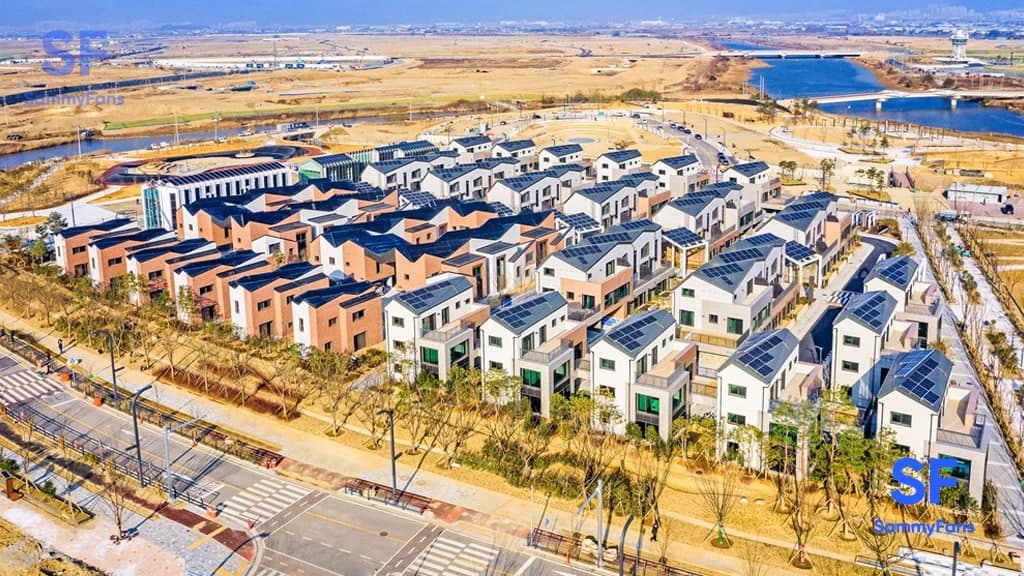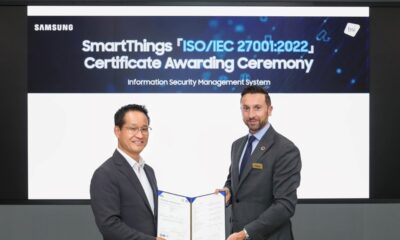News
Samsung building a futuristic home in Korean smart city

On December 27, Samsung announced that it’s building a futuristic smart home in Busan EDC (Eco-Delta City), which is a national pilot city for smart cities in South Korea. Hosted by Korea Water Resources Corporation, the Eco-Delta City is a smart city built with 30,000 households on an 11.8 km square site in Gangseo-gu, Busan.
As an innovative technology operator in the smart home field, Samsung participated and supplied various home appliances and solutions to the 56th generation of Smart Village, a demonstration complex that is the first to move into Eco-Delta City.
Join SammyFans on Telegram
In South Korea, Smart Village introduces innovative technologies in five fields that include:
-
- Healthcare
- Robots
- Living environment
- Data
- Water
These innovative technologies operate in the form of a ‘Living Lab’ where residents can experience a smart home while living in real life for the next five years.
And Samsung’s supplying 15 products including family hub refrigerators, washing machines, dryers, air dressers, dishwashers and vacuum cleaners, as well as QLED TVs, air monitors, and Galaxy Tabs.
Residents use SmartThings
In order to control home appliances, residents use Samsung’s SmartThings app, as well as control lighting, blinds, air conditioning, and heating, check absent visitors, manage unmanned parcels, and check notices. You can use it to live comfortably.
Besides, the Korean tech giant plans to play a role in suggesting an ideal model in the smart home field in the future smart city national pilot city by providing a variety of convergence services that help convenience in life.
Chan-Woo Park, vice president of Samsung Electronics Home Appliance Business Division said:
“Samsung Electronics is actively expanding the customized smart home experience based on premium home appliances and SmartThings, which boasts excellent expandability. We will continue to work hard to develop smart home solutions that allow people to enjoy a lifestyle that suits them.”

News
Here’s why Google Messages replaced Samsung Messages on Galaxy devices

Samsung’s latest foldable phones come with Google Messages by default. The company has now revealed the reason behind this move on Galaxy devices. Samsung says Google Messages replaced Messages to foster RCS adoption.
According to AndroidAuthority, a source explained Samsung’s decision to switch to Google Messages as the default messaging app. The recently released Galaxy Z Flip 6 and Z Fold 6 come with Google Messages with RCS enabled by default.
Looks like promoting Google Messages on Galaxy devices will boost RCS adoption. Samsung Messages isn’t already installed on newer phones. However, one’s stopping you from getting it on your Galaxy from the Galaxy Store.
While many apps support the RCS feature, Google Messages offer the best user experience. Making it a default messaging app is an effort to boost the adoption of RCS tech. Apple is also preparing to bring RCS chat functionality to iMessage for iPhones.
What Samsung source said:
- Even if messaging apps follow the RCS standard, the availability may be limited depending on which app the other party uses. That’s why we decided to make Google Messages the common messaging platform, allowing Galaxy users to communicate more freely. This also enables a messaging app to respond to changes of the RCS standard more quickly and efficiently.
Previously, Samsung devices launched in the US came with two messaging apps. This time, the company has removed the Samsung Messages. During the first setup, users are notified that Google Messages is the default messaging application.
News
Samsung SmartThings gets ISO 27001 certified

Samsung SmartThings gained the international standard ISO/IEC 27001:2022 certification. The company has officially announced this major development in its global connected living platform.
SmartThings received ISO/IEC 27001:2022 certification for information security management systems. Certification reiterates that the SmartThings Cloud operates per international standards.
To be certified, a company has to meet the standard across a total of 123 detailed items, including policies for information security, access control for information assets, and incident response.
SmartThings receiving the ISO 27001 certification is the result of our sustained focus on the protection of information in a hyper-connected world with exponentially increasing intelligence.
Seungbum Choi, Executive Vice President and Head of Device Platform Center at Samsung Electronics said “this is just another step in our drive to fortify the platform’s security. We will continue to find new ways to ensure that SmartThings’ personalized services are provided even more safely.”

BSI Prez says that they have recognized that the operation capability and security level of Samsung SmartThings is excellent. It will further boost trust in the SmartThings platform and strengthen business competitiveness.
ISO 27001 is the leading global standard for ISMSs and was established by the International Organization for Standardization. It provides companies with guidance to manage the risks to information assets systematically and achieve information protection goals.
News
Dr.diary fuels Samsung Health with glycated hemoglobin algorithm
Samsung Health app integrated the Dr.diary (Doctor Diary) glycated hemoglobin feature. The blood sugar management platform announced the launch of its glycated hemoglobin estimation functionality on Samsung’s Health application.
According to ETNews, Dr.diary announced the integration of a glycated hemoglobin level feature in Samsung Health. Galaxy users will now be able to check the estimated glycated hemoglobin level provided by Doctor Diary.
To activate the feature, Health app users will have to permit certain conditions of data in the Blood Sugar service. It is worth noting that glycated hemoglobin is a key figure for diabetes diagnosis, which users will find worth using in the Health app.
Established in 2017, Dr.diary is a blood sugar management platform. It analyzes and predicts the changes in glycated hemoglobin using its own algorithm. Earlier this year, the firm secured a patent for “glycated hemoglobin estimation based on blood sugar data table.”
Song Je-yoon, CEO of Doctor Diary, said, “With our predicted glycated hemoglobin level prediction algorithm being installed in Samsung Health, more people will be able to recognize their glycated hemoglobin level and manage their health more efficiently.”

Glycated hemoglobin (HbA1c) is a standardized numerical value of the percentage of hemoglobin, such as hemoglobin, which has been glycated by glucose. Glycated hemoglobin reflects the average blood sugar level over the past 2-3 months.
Samsung Health (with Wear OS Galaxy Watch) users can conveniently check their estimated glycated hemoglobin level within the app and use this information to manage their blood sugar levels through diet and exercise.












